Many guitarists and bassists have no understanding of music theory or standard notation, but it’s not that difficult when you break it all down. It doesn’t take a lot of time to learn the basics. In fact, in other articles, I’ve stated that you can get a handle on the fundamentals with six months of continuous, daily, study.
Music theory is not hard to learn as long as you have good instructions, a willingness to learn, and the ability to practice consistently. It’s not all that difficult if you take a little time out of each day to practice and achieve small and obtainable goals.
Why Music Theory Isn’t Hard to Learn
1) Music Theory is Based on Simple Mathematics
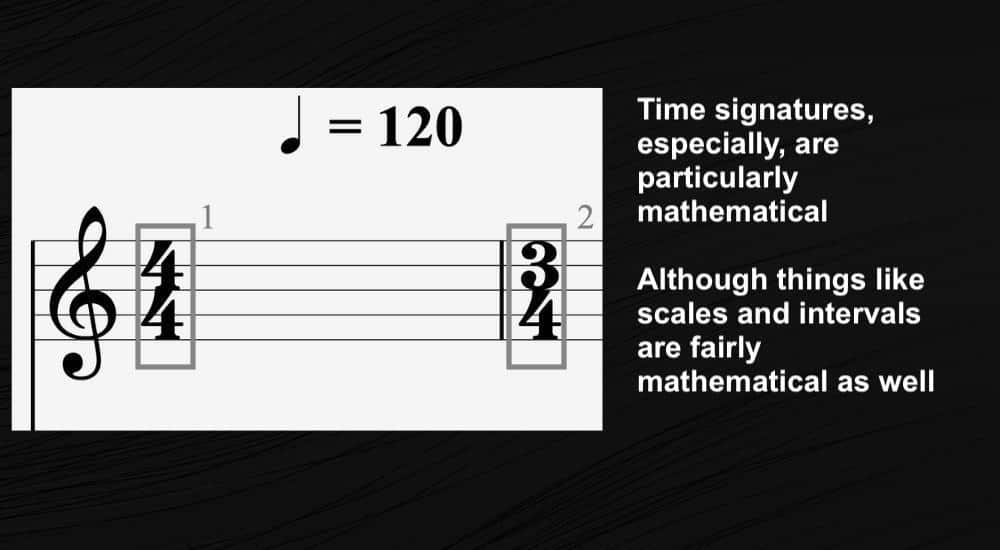
There are only seven notes you need to know, and their relationships are based on simple math. You don’t move more than one or two guitar frets or piano keys away to play the next note.
Depending on the combination of the first two notes, you can predict what’s going to happen next in the progression if you understand what the notes of the key and scale are, or you have a solid understanding of common harmony.
Melody has notes within patterns, but the other part of music, rhythm, is all mathematical. Rhythm is taking a measurement and dividing it up into the beats which give the music the foundation or the pulse. It’s a large part of music theory, but like anything worth learning, it just takes practice and repetition.
Learning to keep and play on time, while inherently mathematical, is also a skill that’s acquired with repetition. For far too long, I played guitar in a freestyle way and didn’t keep time at all which wound up being a pretty big mistake on my part.
In contrast to the advice that had once been given to me by my brother, who literally went out and bought me a metronome.
What I’m trying to say is that while music is very mathematical, it’s not like you’re out here doing calculus when writing or understanding music.
These are different things, however, what I would say is that music theory is based on the most simple of mathematics, like 3rd grade (or grade three for my Canadian readers) mathematics, so it’s not terribly difficult to understand.
Additionally, many memorization techniques are based on patterns and mnemonic which are similarly mathematical but not at all difficult to grasp and implement, in fact, many of them are kind of fun which is what we’re about to talk about (my guide on how to memorize key signatures on Traveling Guitarist has a few of these mnemonics).
2) Music Theory is Fun to Learn and Then Apply
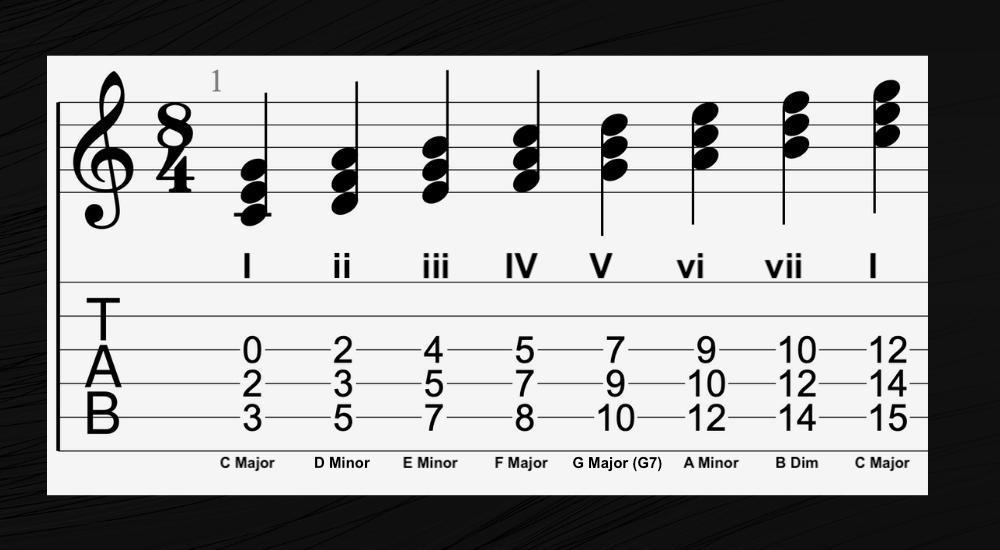
When it’s easy (but still a challenge), it is a lot of fun, and the more theory you learn, the easier it becomes. For instance, when you start learning the order of sharps and flats in all the key signatures.
For instance, you may feel a bit overwhelmed but once you get a good handle on them and you use that information all of the time, it’ll come to you like breathing.
And all music theory concepts are interconnected (to some extend) so you’ll start finding the relationships between them easier. This is when it gets even more fun because you will begin to understand the structure of songs and chord progressions.
When you find a familiar progression, it’s easier to learn on your instrument because it all of a sudden becomes understandable. One example that comes to mind is the harmonic minor scale which is just the natural minor scale with a raised 7th degree. All of this knowledge piggybacks off of each other.
What I like about music theory is the universality of it and its application across every instrument and every DAW. If you know what the major scale is, for example, and you’re familiar with intervals and how chords are made, it’s very easy to make your own chords in a DAW like Garageband or FL Studio.
For example, if you know that a ii-V-I progression sounds cool, it isn’t hard at all to draw that in Garageband’s piano roll (my guide on that, btw).
Another super fun way to apply theory is to take a chord that you think sounds beautiful regardless of the instrument that it’s played on, and you can deconstruct and arpeggiate it in any way that you choose.
For instance, I love the minor 9 chords, and I know that really it’s just a minor 7th arpeggio with the 2nd note of the scale added to it. This means that if I want to play an A Minor 9 arpeggio, I just have to play a regular minor 7th arpeggio but add the B natural in there.
If you aren’t familiar with this stuff, no worries, because Punkademic has an awesome course about this which I’ll talk about in a moment.
3) There are Thousands of Free Music Theory Lessons Online

Like I said in my guide on how to learn music theory, YouTube is great for learning this stuff, particularly Beato’s channel which is pictured above. I said in my other article that Rick is a great teacher and he’s got all kinds of awesome videos on the basics of music theory that you can check out. MusicTheory.net is awesome too.
Just like learning just about anything these days, everything is online if you search for it. There are some really great instructors out there who have dedicated a lot of time to share their knowledge with people in a fairly digestible way.
So don’t be afraid of YouTube because it’s a great resource for learning music theory and many other musical topics too. Music production tutorials are another big one on YouTube.
4) There Are Structured Programs Available To Learn From on the Internet
In a classroom setting, there is almost always a syllabus that the instructor has carefully curated for you to take their course.
There are programs available online, much in the same way, to help you in your musical journey. Being organized is the best way for you to keep diligent and excited about learning, so start with a schedule and keep it simple. That brings me to the best one I’ve seen.
A) Punkademic’s Music Theory Comprehensive Complete (the All-Access Pass)
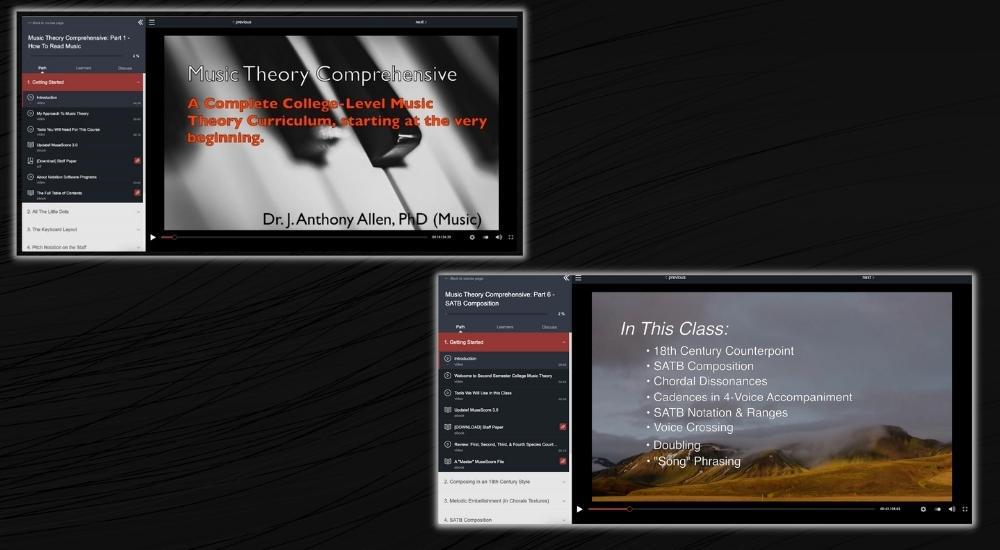
I first stumbled on Music Theory Comprehensive Complete from Jason Allen on Udemy a few months back and I went through all of it, even though I’m already pretty good on the fundamentals of theory.
After chatting with him via email a bit, I found out that he hosts the course (and hundreds of others) right on his own site and I made sure I took advantage of that.
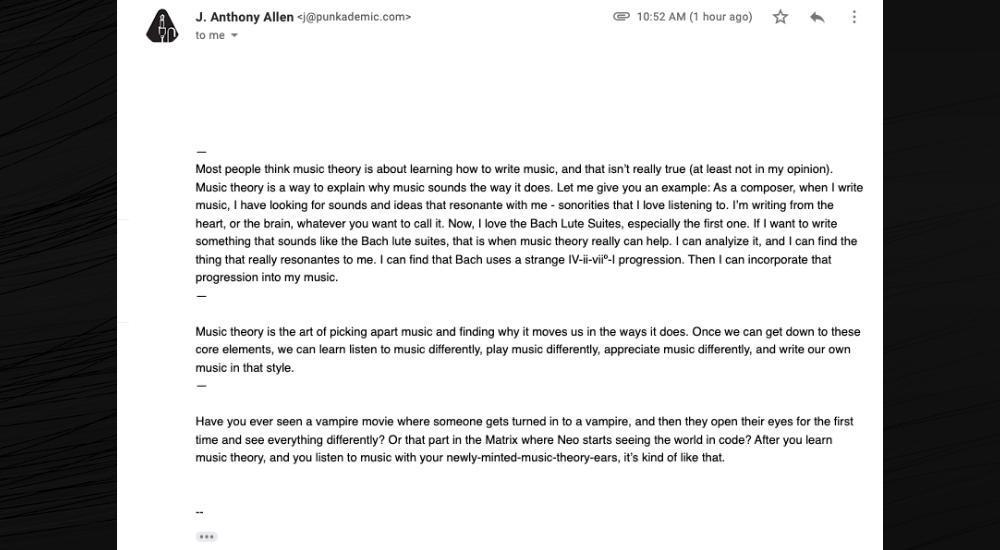
I couldn’t recommend getting the All-Access Pass (from this link) to the site enough because Music Theory Comprehensive Complete is the best course I’ve seen on music theory. There are 21 parts to it, and by subscribing to the site for $20 per month, you can go through all of it and many other courses too.
It features everything you could ever want to know in a structured, easy-to-follow, organized, and comprehensible fashion. It’s clear, concise, and to the point, and I think it’s an essential course for any musician or music producer.
If you’ve diligently gone through the course, paid attention to everything, and you’ve followed instructions, you should almost certainly have a total comprehension of the fundamentals (80%) of music theory. Start with Part 1 here after having gotten the All-Access Pass.
B) Piano For All

Piano For All (from my Product Page) is a great way to learn piano, especially if you are looking to start with the absolute basics, and in a short amount of time, you’ll be able to understand a lot more than that. It’s structured and set up to make you succeed.
All you have to do is spend some time with it every day, and in no time, you’ll be playing some of your favorite songs.
I’ve talked about this program before elsewhere on the site but what I think is worth stating again is that PianoForAll is great at getting you through the fundamentals of theory and piano very fast and in a way that’s almost immediately applicable.
5) Learning Music Theory is A Lot Like Learning a Language
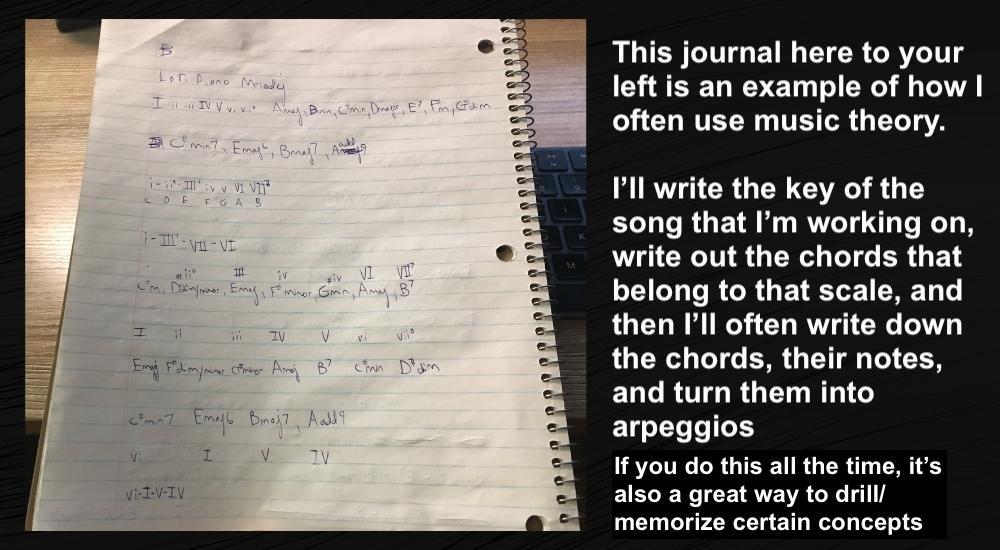
To become bi-lingual, you have to learn new words and how to put them together in a proper sentence. It sometimes takes people years to learn a new language, unless they speak it every day and with other native speakers.
To learn music, it’s the same principles; play every day and with other people, and it becomes easier over time. Repetition and application are the key here.
I think a commonly understated way of doing this is also teaching. In other words, teaching principles you’ve learned to students is a great way to solidify the knowledge in your head.
6) Learning How To Read Music Is The Hardest Part of Music Theory (And It’s Not Necessary)
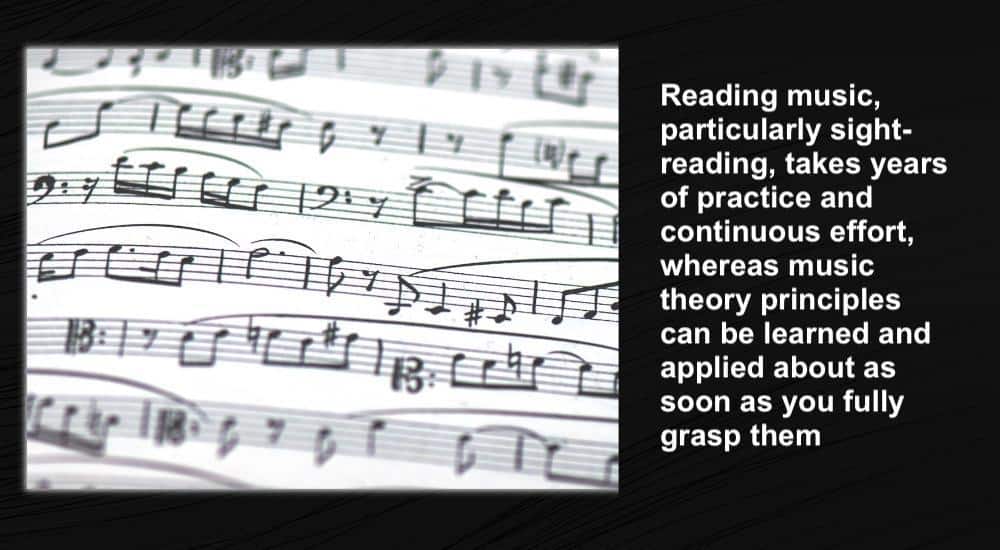
Like the image says, learning how to read music and apply it to your instrument, particularly sight-reading which is the practice of playing a piece of music for the first time after having just read it, are really the hardest aspect of “music theory,” although, I’m not even sure I would refer to it as theory.
In many ways, they’re actually fairly separate because music theory is the study of why things sound the way they do whereas learning to read music is a completely separate skill.
I think it’s worth stating though that you don’t have to be some kind of sight-reading genius to understand music theory concepts which is what I’m getting at here.
Just being able to identify the notes on the staff including their time values is really all that’s needed to understand and apply music theory principles. This should give you some encouragement, knowing that the most challenging part is something that’s not even totally necessary.
For exercises and drills, get Mark Sarnecki’s Complete Elementary Rudiments as well as the Answer Book. I’ve recommended it a thousand times and I’ll recommend it again because it’s the best book for that that I’ve found.
Regarding your music reading skills which you do need to have at the most basic level to understand the theory, you don’t have to memorize a lot either, just seven notes, the accidentals, and how to read them on the two clefs.
Once you’ve done that, you have made it over part of the hump and you’re ready to understand the relationships between notes and the study of harmony.
7) You Won’t Need (Any) Part of Music Theory to Start Playing Music
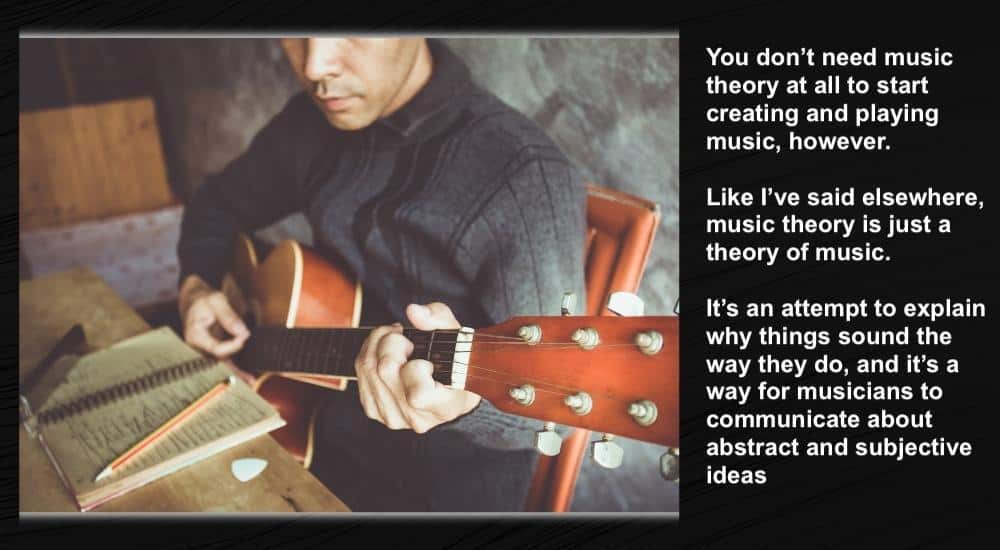
As much as most people want to learn everything music theory has to offer, you don’t have to if you’re going to start making music. You may be surprised how many musicians out there don’t know much and can play great compositions. However, keep in mind that if they knew more, they would probably be even better musicians.
Gear Mentioned
1) Metronome
2) Punkademic’s All-Access Pass
3) Mark Sarnecki’s Complete Elementary Rudiments and the Answer Book
4) PianoForAll (on their site)

 Written By :
Written By :